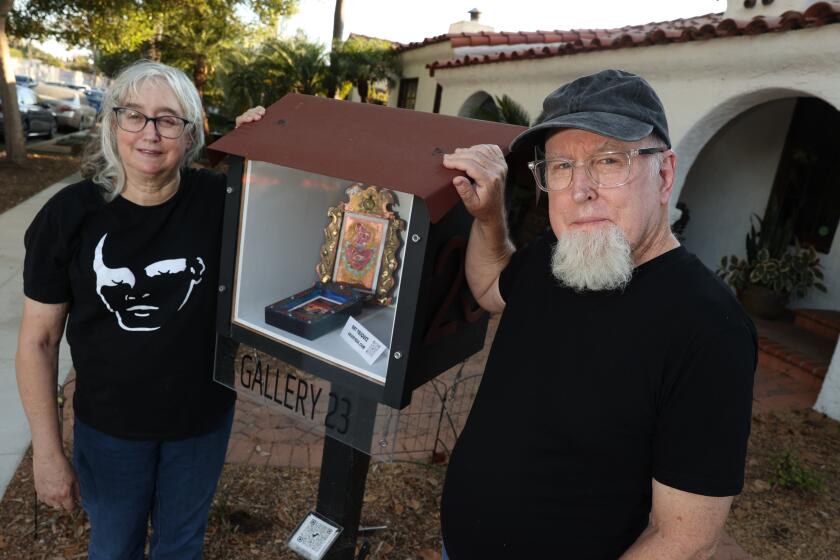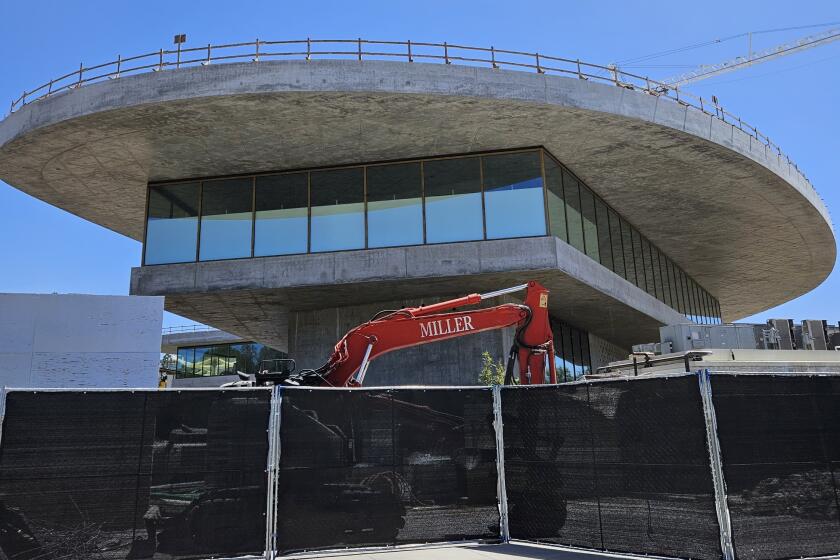Ruling May Affect Many Landmark Structures : Preservation: Former Mayor Lee Prentiss wins a three-year court battle to expand his historic home. The decision could have statewide ramifications.
The former mayor of South Pasadena has his building permit back this week after winning a ruling from the state Supreme Court that has ramifications for historic buildings throughout California.
Former Mayor Lee Prentiss now has permission to expand his 86-year-old Craftsman-style home, some of which has been sitting under tarps during Prentiss’ three-year legal battle against the city.
“They say you can’t fight City Hall,” Prentiss said triumphantly. “Well, you can. And you can beat it.”
For a price. Prentiss’ legal expenses ran more than $100,000, using up the money he had planned to spend on his house. After he ran out of money, he represented himself in his successful case against the city, even though he is not a lawyer.
The state Supreme Court last Thursday rejected an appeal by South Pasadena of a state appeals court ruling. That ruling said the city had wrongfully revoked Prentiss’ permit to expand his 3,500-square-foot Oaklawn Avenue home.
The legal battle began in September, 1990, when the city revoked a permit issued the month before for a three-story, 1,750-square-foot wing to Prentiss’ house.
City officials said they had to revoke the permit because the house was on the State Historic Resources Inventory and thus had to comply with the State Historical Building Code. That meant the expansion plans needed environmental review.
But by then, Prentiss had sealed off doors on the south and west sides, blocked off entrances to rooms, cut a new arch in the south wall, removed cement and bricks from the exterior and poured new cement foundations.
Sections of Prentiss’ house have remained covered in plastic and tar paper.
The Supreme Court decision carries consequences for historic buildings throughout the state, said Antonio Rossmann, a private attorney who represented the city in the case. State regulations to protect historic structures are voluntary and carry no real force, he said.
“The court decision says the state historic building code is at the owner’s option,” Rossmann said. Under the ruling, Rossmann said, cities must rely on their own local laws and cannot invoke the state regulations to keep historic buildings intact. Perhaps, he said, the ruling will prompt the Legislature to rewrite the code.
The National Trust for Historical Preservation will seek a revamping of the state code, said regional director Kathryn Burns. Meanwhile, she said, “I just hope there aren’t a lot of Lee Prentisses out there who want to destroy their houses and see this case as an advantage.”
The Trust, along with the state attorney general and the Los Angeles Conservancy, filed legal briefs supporting the city in its court case.
William Delvac, chairman of the Los Angeles Conservancy’s legal committee, played down the importance of the case. He said that in most cities with historic structures, such as Los Angeles, San Diego and West Hollywood, local laws designate homes as historic, and any changes to them already require environmental review. The same is true in nearby Pasadena, city officials there said.
The legal battle is not over. Yet to be resolved is a lawsuit against the council and other former and present city officials filed in October, 1991, by Prentiss and his wife, Shirley, alleging the city violated their civil rights by revoking the building permit.
Prentiss, who is in charge of detectives at the Los Angeles Police Department’s Rampart Division, alleges that officials revoked the permit out of malice because they did not like his conservative political and religious beliefs.
City officials deny the charges and contend they had no choice but to pull the permit or face a lawsuit by the state or Prentiss’ neighbors for failing to uphold state law.
A status conference on the case is scheduled for the end of August. Settlement negotiations have taken place this year.
Prentiss is seeking more than $100,000 in losses because of the delays in construction on his home, unspecified punitive damages and legal fees.
More to Read
Sign up for Essential California
The most important California stories and recommendations in your inbox every morning.
You may occasionally receive promotional content from the Los Angeles Times.











